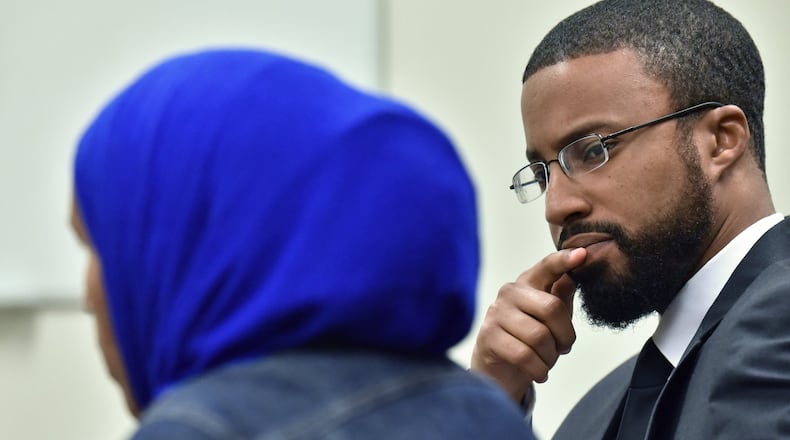Aisha Hussain thought she was doing the right thing for her sister when she called 911 for help.
That decision haunts her today.
Her younger sister, 36-year-old Shukri Ali Said, who suffered from bipolar disorder and other mental health issues, was shot to death on April 28 by Johns Creek police officers after they said she failed to respond to commands to drop a knife.
Hussain thought her 911 call — in which she said that her sister was mentally ill and had left the house on foot and had a knife — would lead to Said being hospitalized and given a psychiatric evaluation. She didn’t expect that it would lead to her death.
The only reason “I have not lost my mind is because I have faith,” said Hussain, who is talking extensively for the first time about her sister and what happened that April morning. “There’s nothing I can do to change the outcome. If I hadn’t called 911, what would have happened that morning? I wish I knew about other alternatives, someone else to call or another way of dealing with it, but I didn’t. … At that point, what was needed of me was to take action.”
Said was shot multiple times by two police officers during the incident near Abbots Bridge and Sweet Creek roads in north Fulton. That morning, Said left the home where she had lived with Hussain and her family since 2017. At first she tried to leave in a vehicle, but Hussain stopped her. Then Said grabbed a purse, her passport, wallet and a knife from the kitchen and left on foot.
According to a release from the Georgia Bureau of Investigation, which is looking into the incident, Said had threatened a family member with the knife.
Related: Family of Johns Creek woman killed by police hold memorial service
Related: How Atlanta police handle calls involving the mentally ill
The last time Hussain saw her sister alive, she was walking toward the front of the subdivision. Police started to arrive.
Hussain, who went back inside to check on her three young children, felt helpless.
“I had exercised all the options I had,” she said. “Other than literally sitting on her, there was nothing I could do.”
Johns Creek police could not comment on specifics of the case because it is still under investigation by the GBI. For that reason, it’s not known exactly what happened or what threats Said posed to officers or the public, but Hussain and her attorneys think police officers may need to re-evaluate their response and de-escalation tactics when dealing with someone who is mentally ill or suspected of being so.
For now, Said’s family wants to use her death to call attention to better police training to deal with people with mental health issues. A Johns Creek police spokesman says their officers do undergo training to help them with such situations involving people with mental illness.
It’s unlikely that training can always avert shootings in cases like this one. But experts say that too many cases involving mental illness end tragically.
In recent years, there have been several high-profile police shootings of individuals with mental illness, autism or Alzheimer’s disease.
According to a recent Atlanta Journal-Constitution analysis, mental illness played a role in a third of 30 fatal police shootings in the state in 2017. The newspaper has tracked deadly police shootings since 2010.
Ibrahim Awad, who represents the family, believes Said’s mental illness played a role in her death. Police should “protect people who can’t protect themselves.”
Bryan Gibb, director of public education for the National Council for Behavioral Health and supervisor of the master trainers who teach the council-designed Mental Health First Aid, agrees.
The course teaches people, including law enforcement, how to identify, understand and respond to signs of mental health and substance use challenges and crises. It’s currently being taught in more than 500 police departments, including several in Georgia, and more than 150,000 sworn police officers around the nation have taken the course over the past six years.
“Our argument is that because at least 10 percent — if not more — of police calls are related to mental illness, then there should be specialized training that gives them the ability to recognize the signs of mental illness, understand and have the tools to de-escalate a situation as well as provide resources that can help,” he said.
Related: Woman dies after being shot by Johns Creek police
Capt. Chris Byers, a spokesman for the Johns Creek Police Department, said 23 percent of its 75 sworn police officers are certified crisis intervention officers. Five of the department’s officers have been through the eight-hour course of Mental Health First Aid. The entire department is slated to complete the training by year’s end.
“We are actively part of several different partnerships on mental health,” Byers said. “One of our lieutenants sits on the advisory board of the North Fulton Mental Health collaboration, as well as the Johns Creek Suicide Prevention Task Force.”
Of the two officers who fired on Said, for instance, one is a certified negotiator and crisis intervention officer with over 300 hours of training on those disciplines.
The other attended de-escalation tactics in 2017. Both officers attended a “Guide to the Muslim Community” class the department put on in 2016.
Experts say Georgia is ahead of many other states with training.
If that is the case, wonders Hussain, why is her sister dead?
Said, a Somali-American Muslim woman, moved to California with her family when she was 11 and became a U.S. citizen in either 2000 or 2001.
Her first name, Shukri, is derived from the Arabic word shukran, which means grateful or thankful in Arabic.
“We were all grateful to be around her,” said Hussain. “She was bubbly and read a lot.” She wanted to be a nurse. She was a perfectionist.
At one point, though, she started getting B’s in class, which was “unacceptable to her.” She was finding it hard to focus. She couldn’t retain what she had read. “I think that was the onset of her mental illness,” said Hussain.
She would quiz relatives about things she should know. She always had this confused look.
In the immigrant community, mental illness can carry a stigma, and families are often loath to seek help.
In 2010, she was diagnosed with bipolar disorder, depression and schizophrenia. She was prescribed conventional medication, but also tried alternative treatments and therapy.
Said didn’t like the way some of the medications made her feel, with side effects such as fatigue and trouble eating and sleeping. Sometimes she heard voices.
“Even with the mental illness, she never had an outburst,” said Hussain. “She was always very, very calm.”
Two or three days before she died, Said became restless.
On April 28, Said woke up at 4 a.m. and was acting strangely. It was clear she was having a mental health episode. Hussain called a sister and they began to search online for places that could help Said.
Said went in her room and closed the door.
When she came out, she was fully dressed.
She was determined to leave. Hussain rushed to call 911.
“I thought they would sedate her and take her to the hospital,” said Hussain.
She would later learn what happened.
Awad and Edward Ahmed Mitchell, executive director of the Georgia chapter of the Council on American-Islamic Relations, said the family was allowed to watch a video. Awad and Mitchell were not, but they interviewed family members about what they saw. The Atlanta Journal-Constitution has not seen the video.
In the video, according to Hussain, Awad and Mitchell, the family sees police approach Said as she is walking alone on the road. An officer recorded on the video would later say that when he first saw Said, she was holding a passport and said that she wanted to go home.
In Hussain’s account, it shows police using a Taser on Said and firing foam impact rounds at her as the encounter unfolds. Ultimately, Said was shot and killed.
Now Hussain is left with fear, anger and frustration.
“I don’t see them (police) as my allies anymore,” she said. “My sister was so much more than her mental illness. She had a mental illness and she died.”
EVENT PREVIEW
Town Hall on Police and Mental Health
“What Happened To Shukri Ali Said and Why? Community Town Hall on Mental Health, Implicit Bias, & Law Enforcement”
11 a.m. Saturday at Masjid Jafar, 11005 Jones Bridge Road, No. 112, Johns Creek. The event is hosted by CAIR Georgia, the Awad Law Firm and Masjid Jafar. For information: cairgeorgia.com or masjidjafaratl.com.
About the Author
The Latest
Featured


